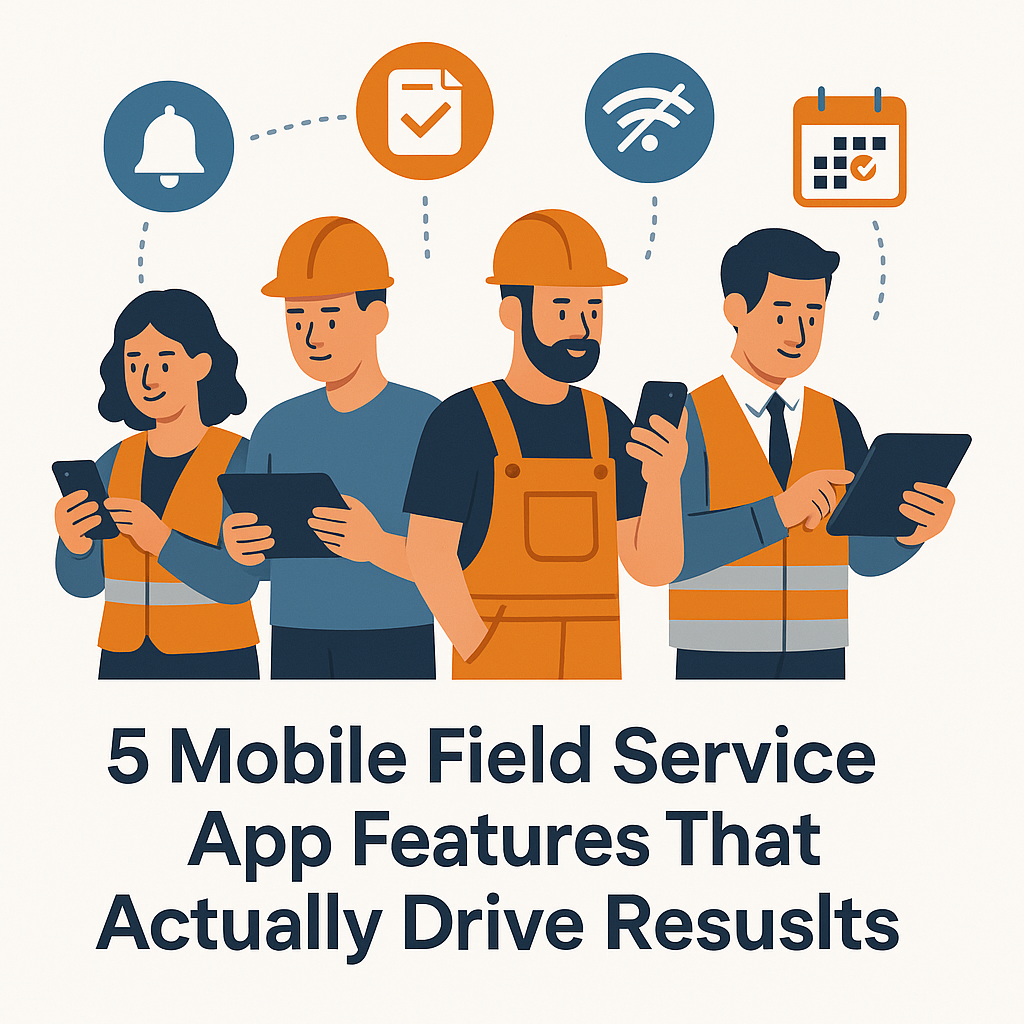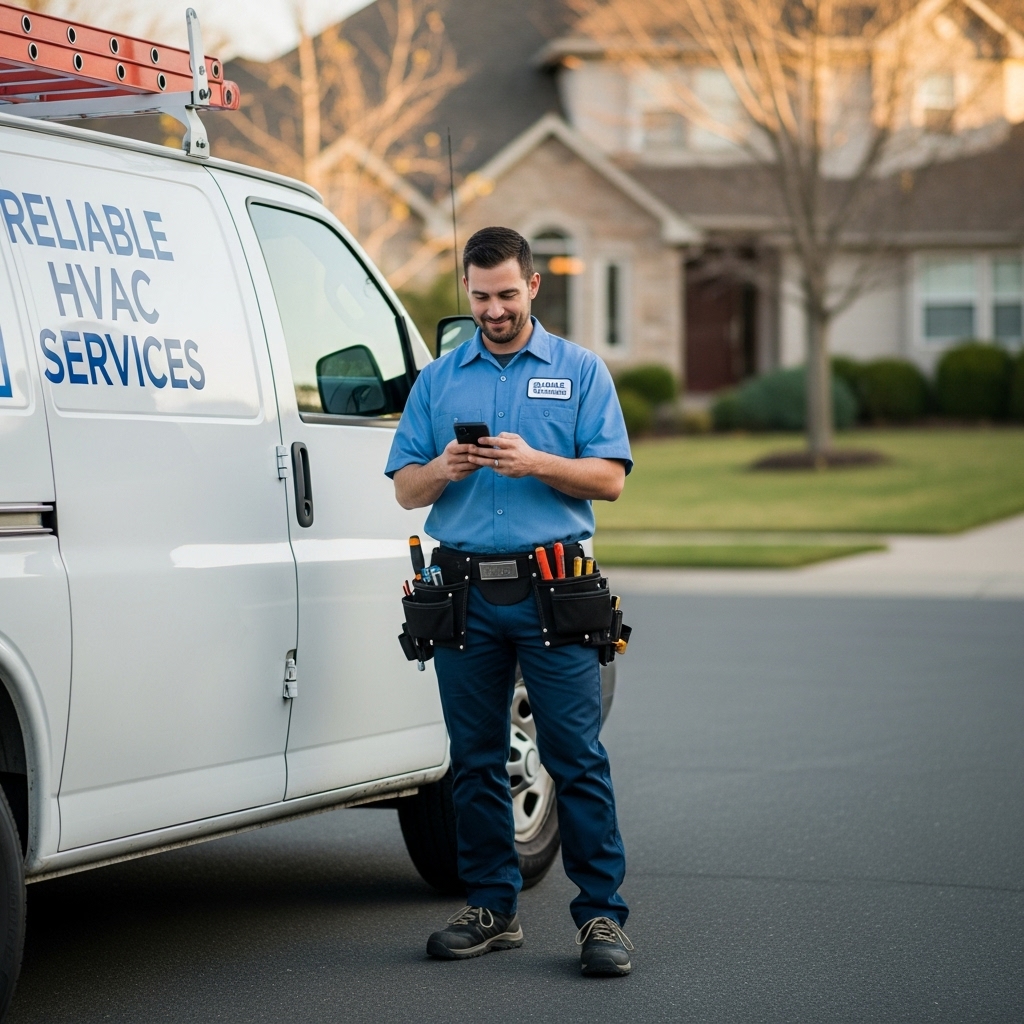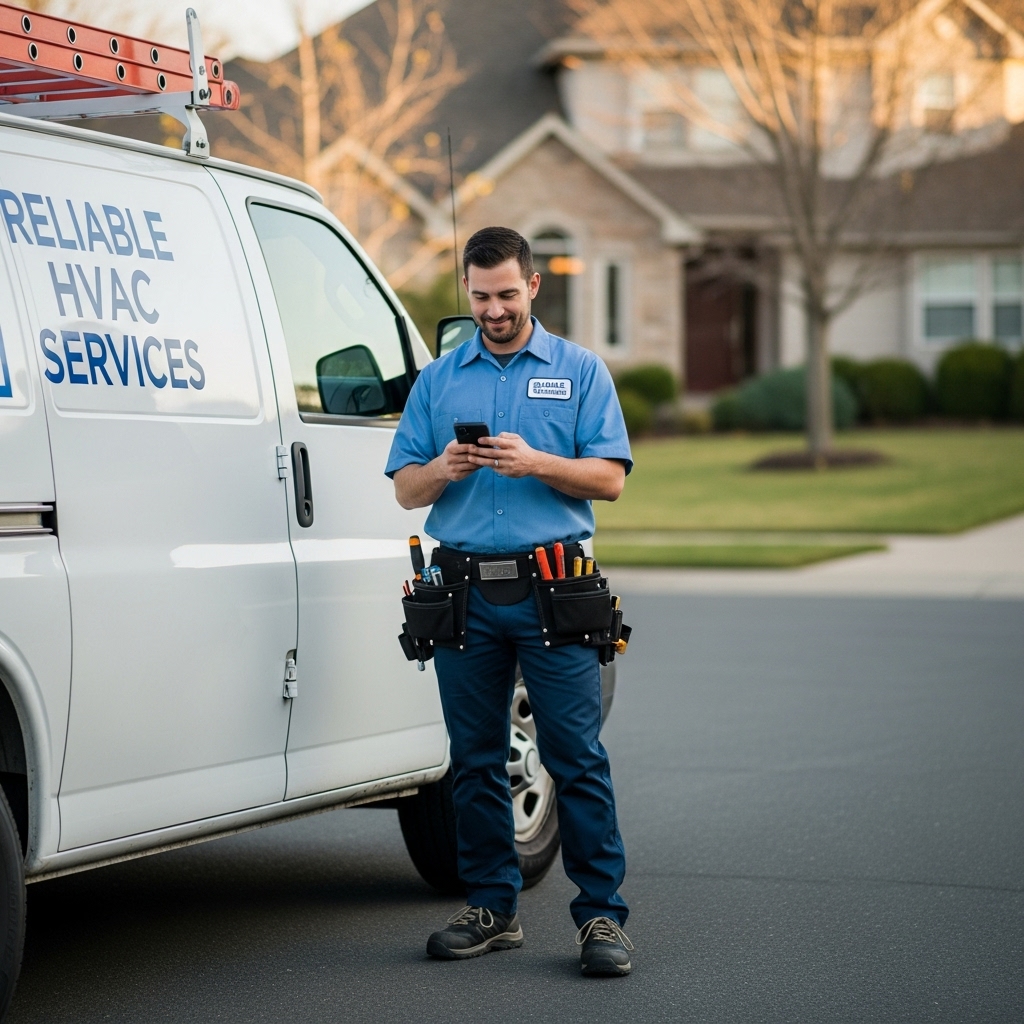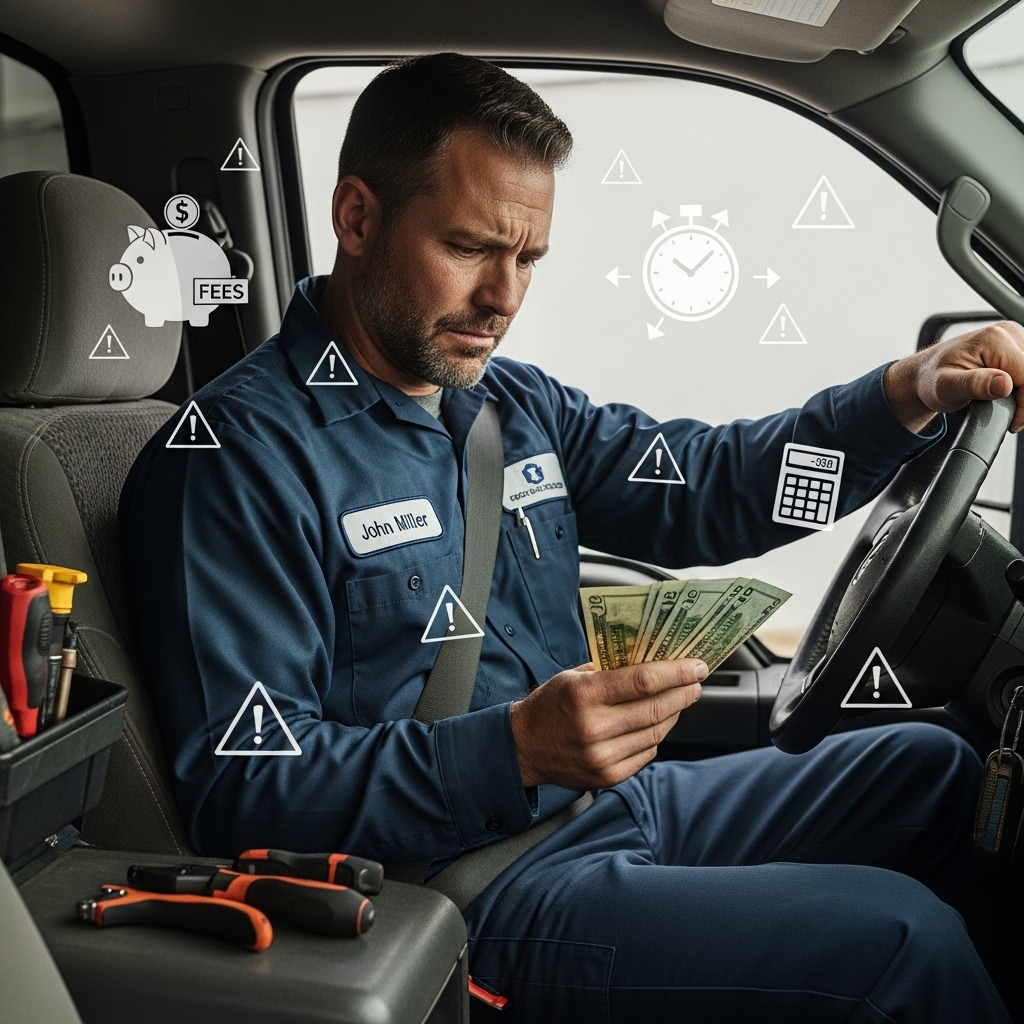TL;DR
Mobile field service apps are no longer optional for contractors who want to stay competitive. The five features that actually drive results are: real-time job access, digital work orders, reliable offline capability, trade-specific functionality, and smart scheduling. These tools reduce administrative time by 30%, cut fuel costs through better routing, and improve customer satisfaction with professional service delivery. Skip the flashy features that don’t deliver—focus on mobile solutions that solve real problems and integrate with your existing workflows.
Why Your Field Service Business Needs Mobile Apps Now
Your competition isn’t just other contractors anymore. It’s the customer’s expectation of instant updates, professional documentation, and seamless service delivery.
Field service mobile software has become essential because of three converging pressures: labor shortages, rising operational costs, and customers who demand the same level of communication they get from ride-sharing apps.
Consider a Phoenix HVAC company that discovered their technicians were spending 2.5 hours per day on paperwork, phone calls, and trips back to the office for forgotten information. That’s 12.5 hours of lost billable time per tech, per week. Multiply that by fuel costs, administrative overhead, and opportunity cost, and you’re looking at thousands of dollars in weekly inefficiency.
Meanwhile, customers have zero patience for “I’ll call you back” or “let me check with the office.” They expect real-time updates, accurate arrival times, and professional documentation. In competitive markets, the contractor with the smoothest operation wins, regardless of who has the lowest bid.
Modern mobile apps solve these problems by putting your entire operation in your techs’ pockets. No more phone tag. No more forgotten job details. No more handwritten invoices that delay payments.
The 5 Mobile Field Service App Features That Actually Drive Results
1. Real-Time Job Access and Updates
Real-time job tracking mobile capabilities eliminate the communication gaps that frustrate customers and slow down your team.
The difference is dramatic: instead of a tech arriving and asking “What are we doing here again?”, they show up knowing the customer’s history, the specific problem, required parts, and any special instructions like gate codes or pet warnings.
This feature pays for itself through reduced callbacks and improved first-time fix rates. A Denver plumbing company reduced their repeat visits by 40% simply because techs had access to complete job information, including photos from previous visits and equipment specifications.
Real-time updates work both ways. When your office needs to reach a tech with urgent information or schedule changes, the communication happens instantly through the app rather than through phone tag that can last hours.
2. Digital Work Orders and Documentation
Digital work orders mobile app functionality transforms how your business captures, processes, and stores job information.
Paper work orders cost more than you think. Beyond the obvious printing and storage expenses, consider the time spent deciphering handwritten notes, losing forms, and re-entering information into your accounting system. Digital work orders eliminate these inefficiencies while creating a permanent, searchable record of every job.
The professional impact is equally important. When a tech pulls out a tablet to document the work, take before-and-after photos, and collect a digital signature, it signals competence and attention to detail. This professional appearance often justifies premium pricing.
For electrical contractors, digital documentation also supports compliance requirements. Code inspectors appreciate clear photos, detailed material lists, and organized records that prove work was completed to standard.
3. Offline Capability That Actually Works
Offline field service apps are crucial because connectivity issues are a daily reality for contractors working in basements, rural areas, or commercial buildings with poor cell coverage.
The key word here is “actually works.” Many mobile apps claim offline functionality but fail when you need them most. True offline capability means techs can access job information, update work orders, capture photos, and collect signatures without any internet connection. When connectivity returns, all data syncs automatically to your main system.
An Austin landscaping crew discovered this firsthand when working on properties in hill country areas with spotty cell service. Their offline-capable app allowed them to complete full job documentation even in dead zones, preventing the delays and frustrated customers that plagued their previous paper-based system.
Look for apps that download essential job data when techs have connectivity, so they’re never stranded without critical information.
4. Industry-Specific Features for Your Trade
Generic mobile apps miss the specialized needs that separate professional contractors from handymen. HVAC mobile apps for technicians and plumbing field service software should include features tailored to your specific trade.
For HVAC technicians, this means equipment databases with model numbers, warranty information, and diagnostic codes. Techs can quickly identify parts, check warranty status, and reference manufacturer specifications without carrying multiple catalogs or making phone calls to suppliers.
Plumbing professionals need different functionality: parts lookup databases, permit tracking integration, and photo documentation that supports insurance claims. The ability to show customers exactly what’s wrong (with clear before-and-after photos) builds trust and justifies recommended repairs.
Electrical contractors benefit from built-in safety checklists, code compliance reminders, and load calculation tools that ensure work meets local standards while protecting both customer and contractor.
5. Smart Scheduling and Route Optimization
Contractor mobile app features should include intelligent scheduling that considers travel time, traffic patterns, and technician skills when assigning jobs.
Route optimization alone can save substantial money. A Tampa electrical company reduced their weekly fuel costs by 25% and increased their daily job capacity by 15% simply by using smarter routing. Instead of techs driving across town between jobs, the system groups nearby appointments and optimizes travel sequences.
Smart scheduling also improves customer satisfaction by providing accurate arrival windows. When customers receive realistic time estimates that account for actual travel conditions, they’re far more likely to be available when the tech arrives.
The productivity gains compound quickly. Better routing means more jobs per day. More jobs per day means higher revenue per technician. Higher revenue per technician means better profitability without raising prices.
Red Flags: Mobile App Features That Sound Good But Don’t Deliver
Not all mobile app features are created equal. Some sound impressive in sales demonstrations but create more problems than they solve.
Over-Complicated Interfaces
If your techs need extensive training to use basic functions, the app will slow them down instead of speeding them up. Look for intuitive interfaces that feel familiar, not revolutionary.
Internet-Dependent “Mobile” Apps
Many apps are just mobile-responsive websites that stop working when connectivity drops. True mobile apps function offline and sync when connection returns.
Feature Bloat Without Integration
Impressive feature lists mean nothing if the app doesn’t integrate smoothly with your existing accounting, dispatching, and customer management systems. Disconnected tools create more work, not less.
Customization That Requires IT Support
Avoid apps that need constant technical support or custom programming to match your workflows. The best mobile solutions work out of the box with minimal setup.
How to Evaluate Mobile Field Service Apps for Your Business
Start with a realistic trial period. Most vendors offer 14-30 day trials, but that’s barely enough time to configure the system and train your team. Push for 60-90 day evaluations that let you test the app under real working conditions.
Ask these critical questions during vendor demonstrations:
- How does the app perform with poor or no connectivity?
- What happens when a tech needs to access job information from six months ago?
- How long does data sync take when connection is restored?
- Can the app integrate with our existing accounting software?
- What’s the actual cost per user including all features we need?
Test the app with your most experienced tech and your newest hire. If both can use it effectively within a week, the interface design is probably sound. If either struggles with basic functions, keep looking.
Plan for a 30-60 day implementation timeline that includes data migration, team training, and workflow adjustments. Rushing the rollout creates frustration and reduces adoption rates.
Transform Your Field Operations with Smart Mobile Tools
Ready to eliminate paperwork headaches and boost team productivity? FieldServ.ai delivers mobile-first field service management with real-time job access, offline capability, and seamless integration with your existing workflows. Stop losing time to administrative tasks and start focusing on the work that drives revenue.
Want to showcase your professional service and convert it into more leads? Our partners at LeadProspecting.ai complement our mobile field service tools through their exclusive Founders Club, offering professional websites that highlight your capabilities, automated social media that builds local visibility, and comprehensive systems that turn satisfied customers into repeat business. Limited to the first 200 contractors with lifetime pricing locked in.
Start Your Free Trial with FieldServ.ai → No credit card required
Join the LeadProspecting.ai Founders Club → Lifetime pricing for first 200 members
FAQ: Mobile Field Service Apps for Contractors
What’s the most important feature in mobile field service apps?
Real-time job access is the most critical feature because it eliminates communication delays, reduces callbacks, and ensures techs arrive prepared with complete job information and customer history.
Do HVAC mobile apps work offline in basements and crawl spaces?
Quality HVAC mobile apps download essential job data when connectivity is available, allowing technicians to work completely offline in basements, crawl spaces, and rural locations. Data syncs automatically when connection returns.
How much do contractor mobile app features typically cost per month
Most field service mobile apps cost $40-120 per user monthly, depending on features included. Factor in reduced administrative time, fuel savings from better routing, and increased job capacity when calculating ROI.
Which mobile apps work best for plumbing companies in Phoenix
Phoenix plumbing companies need apps with strong offline capability (for work in basements), parts lookup databases, photo documentation features, and integration with local permit systems for compliance tracking.
Can field service mobile software integrate with QuickBooks?
Most professional field service mobile apps integrate directly with QuickBooks, automatically syncing job costs, invoices, and customer information to eliminate double data entry and reduce accounting errors.
What’s the difference between mobile apps and mobile-responsive websites?
Mobile apps install on devices and work offline, while mobile-responsive websites require constant internet connection. True mobile apps provide better performance, offline access, and device-specific features like camera integration.
Do mobile work order apps help with compliance in Tampa’s permit process?
Mobile work order apps streamline Tampa permit compliance by organizing required documentation, tracking inspection schedules, storing compliance photos, and maintaining detailed records that satisfy local building code requirements.
How long does it take to train technicians on new mobile field service apps? Well-designed mobile apps require 2-5 days of training for most technicians. Apps requiring extensive training usually have poor interface design and should be avoided in favor of more intuitive solutions.
Can offline field service apps sync data when connection returns
Professional offline field service apps automatically sync all work orders, photos, signatures, and job updates when internet connection is restored, ensuring no data is lost during connectivity gaps.
What mobile features do electrical contractors in Denver need most?
Denver electrical contractors benefit most from offline capability (for basement and commercial work), code compliance checklists, load calculation tools, safety reminders, and integration with local inspection scheduling systems.







